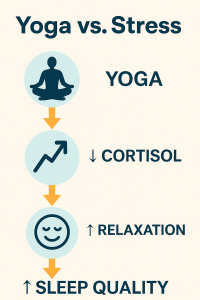In today’s fast-paced world, sleep has become a luxury that many struggle to attain. Modern life, with its glowing screens and high-pressure environments, disrupts our natural sleep rhythms, leaving millions sleep-deprived. However, ancient practices like yoga offer a natural and effective way to restore balance and improve sleep quality.
The Modern Sleep Crisis
 Research indicates that we are sleeping significantly less than previous generations. Nearly one-third of U.S. adults report getting fewer than the recommended 7 hours of sleep per night, and the World Health Organization has described insufficient sleep as a public health epidemic. Technology is a major culprit, with blue light from screens suppressing melatonin, the hormone that signals it’s time to sleep. Stress from constant connectivity and tight deadlines also keeps our bodies in a chronic state of alertness, disrupting deep sleep.
Research indicates that we are sleeping significantly less than previous generations. Nearly one-third of U.S. adults report getting fewer than the recommended 7 hours of sleep per night, and the World Health Organization has described insufficient sleep as a public health epidemic. Technology is a major culprit, with blue light from screens suppressing melatonin, the hormone that signals it’s time to sleep. Stress from constant connectivity and tight deadlines also keeps our bodies in a chronic state of alertness, disrupting deep sleep.
The costs of poor sleep are staggering. Sleep deprivation costs the U.S. economy up to $411 billion annually due to reduced productivity, workplace errors, and accidents. Globally, the loss is estimated at hundreds of billions of dollars.
Why Sleep Matters
Sleep is not “lost time”—it’s active maintenance for the body and brain. NREM sleep helps consolidate memories, repair tissues, and clear waste products from the brain, including beta-amyloid, a protein linked to Alzheimer’s disease. REM sleep enhances creativity, emotional regulation, and problem-solving by forming new connections between ideas. Even moderate sleep loss impairs focus, decision-making, and reaction time. Chronic short sleep has been linked to increased risks of Alzheimer’s disease, cardiovascular disease, diabetes, obesity, a weakened immune system, and higher cancer risk.
Ancient Wisdom: How Yoga Can Help
While modern science confirms the critical role of sleep, ancient practices like yoga have long recognized its importance. Yoga emphasizes balance between body and mind, and several of its techniques are now backed by research as effective for improving sleep quality. A systematic review found that yoga significantly improved sleep quality and reduced insomnia severity in adults. Yoga Nidra, a deep relaxation practice, reduces stress and calms the nervous system, supporting a smoother transition into sleep. Practices that combine gentle stretching, breath regulation, and mindfulness lower cortisol levels, one of the main disruptors of restful sleep.
A Simple Nighttime Yoga Routine
Getting a good night’s sleep requires signaling to the brain that it’s time to let go. Here’s a 15-minute yoga-inspired ritual you can try for one week:
- Wash and Massage: Wash your feet and face with lukewarm water. Massage your feet and scalp lightly with room-temperature oil to relax the nervous system.
- Body Scan Relaxation: Lie down and slowly bring your awareness from your toes up to your head. Consciously relax each part of your body, releasing any stored tension.
- Legs-Up Pose (Viparita Karani): Lie on your back with legs elevated against a wall or resting on a pillow. Close your eyes and breathe deeply for 5 minutes. This improves circulation and calms the nervous system.
By blending ancient wisdom with modern science, we can protect one of our most valuable resources: sleep. Give this one-week yoga sleep routine a try. Your brain, your body, and even your workday will thank you.
References and Further Reading
- CDC – Short Sleep Duration in U.S. Adults
- American Psychological Association – Stress and Sleep
- RAND Corporation – Why Sleep Matters: The Economic Costs of Insufficient Sleep
- Science – Sleep drives metabolite clearance from the adult brain
- The effect of chronic yoga interventions on sleep quality in people with sleep disorders: a scoping review.
- Effectiveness of a short Yoga Nidra meditation on stress, sleep, and well-being in a large and diverse sample

